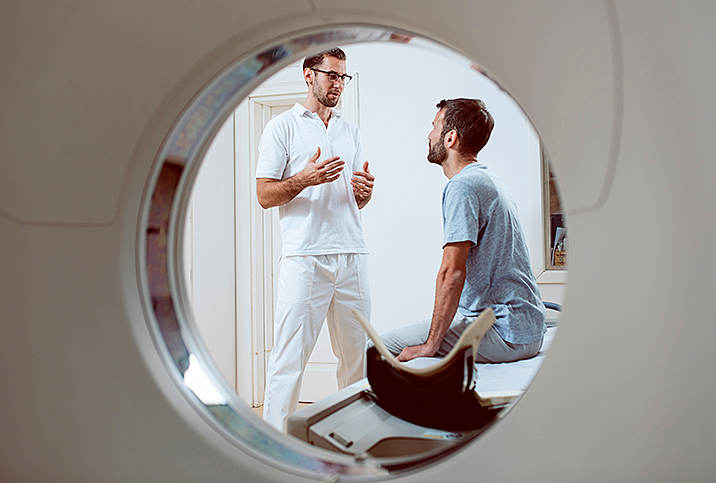Start a Conversation With Your Doctor About Your Prostate Health

While reasons vary, surveys and studies indicate men see doctors less than women do, and of the men who do visit their doctor, 20 percent admit they haven't been completely honest with them.
OK, so men are lax about booking checkups. Big deal, right? Well, yeah. It's something all guys need to be better about because, after all, their lives might depend on it.
This is especially true for men getting a bit older or who have a family history of conditions such as prostate cancer. According to data from the Centers for Disease Control and Prevention (CDC), 13 in 100 men develop prostate cancer, with the highest risk factor being age. Additionally, prostate cancer has been shown to affect Black men more often, with the likelihood of death more than doubled.
Discussing sensitive areas such as your prostate might be uncomfortable, but several doctors offered their input on how to approach the conversation and why you should do it.
Doctors have heard (and seen) it all
Keep in mind when you're seeing a specialist that they have studied, trained and prepared to be faced with an array of medical problems. They've seen nasty skin conditions and people cut open on the operating table, delivered babies and dealt with dozens of situations that the average person would consider "gross" or "uncomfortable."
"You know, physicians are regular people," said Jean Joseph, M.D., a urologist at the University of Rochester Medical Center in New York. "Just like patients don't care for the [prostate] exam, doctors don't care for it, either. But it's something they must do because it can save someone's life."
Prostate exams are something of a joke to many guys. The Canadian Men's Health Foundation even put together a list of funny things men say to their doctors during digital rectal exams (DREs) as a way of deflecting the awkwardness of the situation.
Joseph is clear, though, that doctors try to make it as noninvasive as possible by wearing lubricated gloves to avoid trauma. Ultimately, he urged patients to look at it this way: Cancer can kill you, and we have an effective method of accurately detecting prostate cancer in the early stages before it spreads (potentially into your bones). Thanks to this method, the five-year relative survival rate for prostate cancer is 98 percent. That little bit of discomfort could make a huge difference in your life.
Additionally, a digital rectal exam isn't the only way doctors can test for prostate issues. Physicians regularly use prostate-specific antigen (PSA) tests to determine problems relating to the prostate by analyzing the blood for signs of high PSA, which can be an indicator of cancer and several other conditions, such as inflammation, benign enlargement, recent ejaculation and even the DRE that may precede the PSA test.
"The rectal exam is certainly secondary to the PSA blood test," said Jonathan Shoag, M.D., a urologist at University Hospitals Urology Institute in Cleveland. "There's a fair amount of evidence that a rectal exam in someone with a normal PSA is not really necessary. So if a guy's discouraged or concerned about the PSA screening because they're concerned about the rectal exam, they should know they don't have to get the rectal exam to get their PSA checked."
When and how should you bring up your prostate health?
Generally speaking, at some point, all men should talk to their doctor about their prostate health. But should a 25-year-old schedule an appointment for a prostate exam? How do men know when screening should become part of their regular checkups?
Ultimately, people have to look at their risk factors, namely family medical history and age. As Joseph described it, in general, cancer is a disease of older people.
"As you get older, your body's repair mechanisms don't work as well," he said. "As a result, cancer develops, whether it's from something we've been exposed to or something genetic."
Of course, as both Joseph and Shoag were quick to point out, the goal with prostate exams and screenings isn't to identify a mysterious pain as prostate cancer; the goal is to detect an issue before it even becomes one.
"For men at average risk, screenings should start in their late 40s or early 50s, in my opinion. Current guidelines suggest 55, which I think is a bit late," Shoag said, clarifying that men who are at higher risk should begin regular screenings in their early 40s. This includes people with a family history of prostate cancer and Black men, who face higher morbidity and mortality rates related to prostate cancer.
For many men, it's not going to be as easy as walking into the doctor's office and saying, "Hey, can you take a look at my prostate?" While it cuts to the point, the medical secretary might prefer that you make an appointment with a doctor to discuss this issue.
Jump-start the conversation
Assuming you have an appointment, you still might not know where to begin the conversation about your prostate health.
"First, it's my experience that today's patients are much more savvy about their health overall and are asking informed questions about their prostates. I like that," said Dan Sperling, M.D., founder of the Sperling Prostate Center in Delray Beach, Florida. "Second, and most important, patients should always be honest about their concerns and questions. No question is too embarrassing. The 'right' questions to ask come straight from the heart."
Sperling offered a list of questions that show patients have done their homework and make it easy for doctors and patients to engage in both education and discussion:
- Some doctors don't promote annual PSA blood tests. What's your opinion? Is there a way to improve their accuracy?
- What is prostate cancer? Is it always multifocal?
- Must I have a biopsy?
- Are some biopsy methods better than others, and if so, why?
- What are the side effects of treatment? Are they avoidable?
- What is focal therapy? Am I a candidate?
- Can prostate cancer come back after treatment? If so, what are treatment choices?
- How can I promote having a healthy prostate?
If you're struggling with how to begin the conversation with your doctor, doing some research ahead of time and leading the discussion with good questions—Sperling's can serve as a template—are good starting points.
At the end of the day, the doctor/patient relationship exists to ensure you're getting the care and information you need to live a healthy life, so take advantage of that and don't be afraid to ask questions.


















